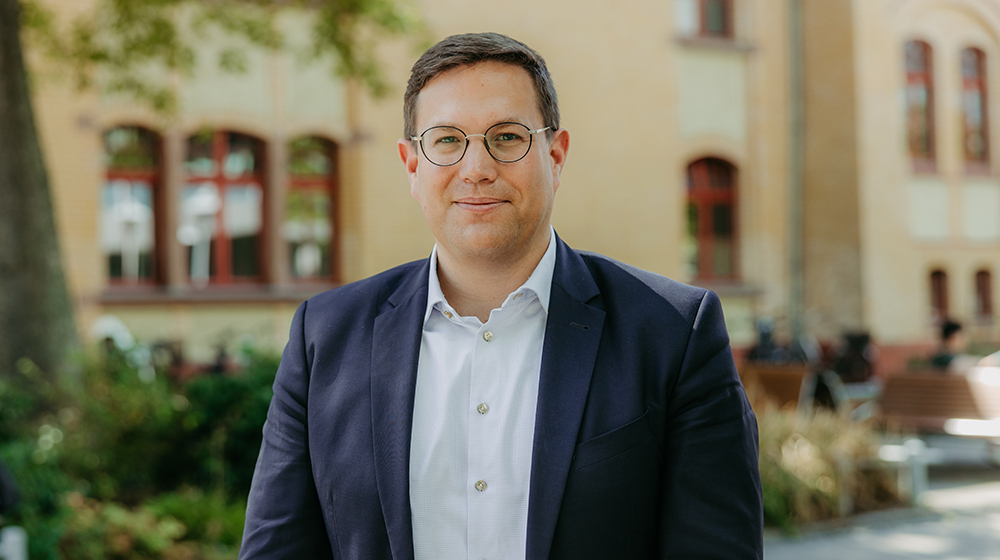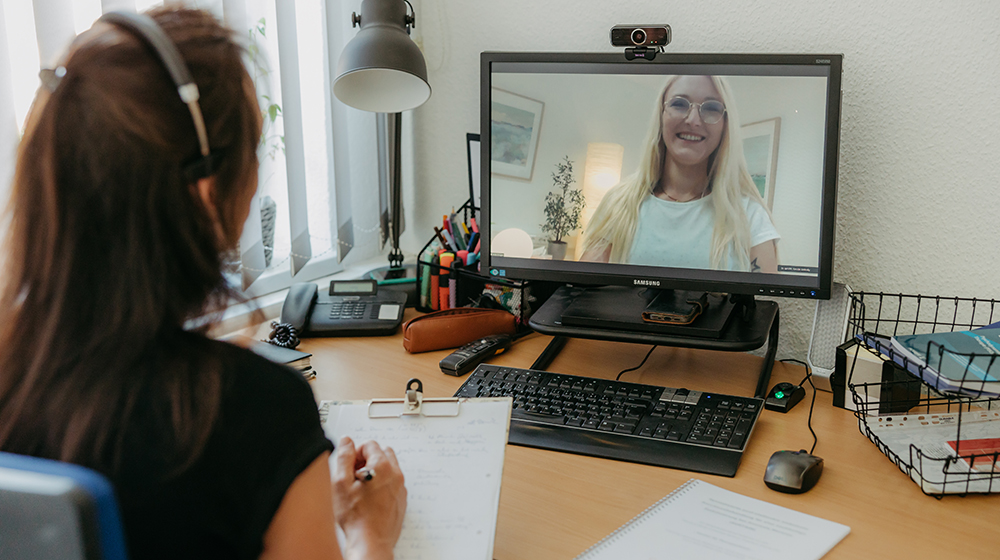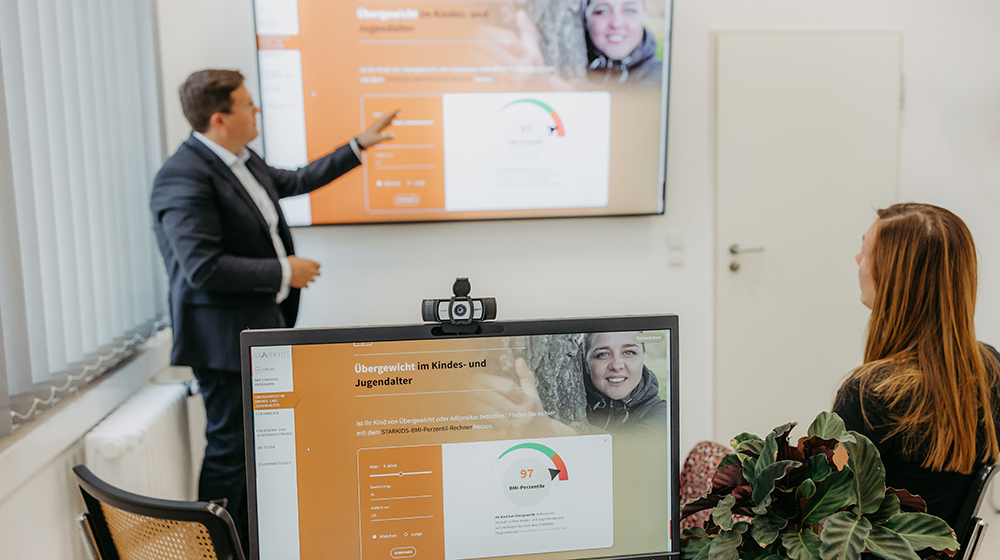
Long waiting lists for treatment, overfull waiting rooms, shortfalls of doctors in rural areas. Nowadays it is not always easy to consult a medical professional. The coronavirus and the contact restrictions that came about as a result of it have made the situation even more acute. However, the pandemic also accelerated something that many people had been discussing for quite a while: telemedicine. The therapeutic and medical possibilities that are emerging are precisely what interests Professor Dr. Florian P. Junne. Exploring them with a view to transforming medicine is one of his areas of research. They are important areas that the scientist has been exploring for many years - and to which he devotes his time in a variety of ways. And not without reason. “It is extremely sensible to harness the digital transformation for health technologies too,” says the Director of the Department of Psychosomatic Medicine and Psychotherapy at Magdeburg University Hospital (UMMD).
 Prof. Dr. Florian P. Junne (Photo: Jana Dünnhaupt / University of Magdeburg)
Prof. Dr. Florian P. Junne (Photo: Jana Dünnhaupt / University of Magdeburg)
For the Magdeburg researcher and his teams, the question of how these new technologies can be used to meet the medical care requirements of the region of Saxony-Anhalt is a key one. He says, “Telephone consultations via video link increased during the pandemic. However, when it comes to extensive telemedicine structures that will, for example, help us specifically to better cater to the northern part of our state, we are still only at the very beginning.” To change this would require all participants, from politicians and health insurance funds to researchers to “actively work together.”
Therapy via zoom
An example of the many components on which the Magdeburg researcher is currently working is the SUSTAIN study. As one of ten centers participating in a nationwide multi-center study, Magdeburg University Hospital under the leadership of Professor Dr. Florian Junne, is examining the effectiveness of a new out-patient treatment and care concept using video-based telepsychotherapy to prevent relapse in patients undergoing treatment for anorexia nervosa. The focus of the study is the after-care and long-term maintenance of treatment success in patients with anorexia nervosa following in-patient treatment.
The basis for the study, which is coordinated by Tübingen University Hospital and funded by the Federal Ministry of Education and Research, was established at a time when for most people the idea of a “video conference” was almost a foreign concept. As long ago as 2015, as part of a research team from Tübingen led by Professor Katrin Giel, Professor Junne published findings from the “Re-Start” study regarding the use of telepsychotherapy and specifically concerning the question of whether patients with a diagnosis of anorexia nervosa could be offered after-care via video conference following out-patient or in-patient treatment. The answers were almost uniformly positive. “Back then, the mainly young patients were very satisfied,” recalls the scientist, who in 2021 moved from the University of Excellence and University Hospital in Tübingen to the Magdeburg campus. According to the scientist, it has been possible to show that after-care via video consultation is not only accepted, but that sometimes it is also possible to break down barriers with it. “Some patients seemed even to find it easier to discuss difficult topics with their therapist when they received video psychotherapy,” recalls Professor Dr. Junne.
 The first results of the "SUSTAIN study" show that digital therapy conversations are accepted by most patients. (Photo: Jana Dünnhaupt / University of Magdeburg)
The first results of the "SUSTAIN study" show that digital therapy conversations are accepted by most patients. (Photo: Jana Dünnhaupt / University of Magdeburg)
The findings from the study are now being incorporated into the more in-depth SUSTAIN study. The expert in psychosomatic medicine, who also actively works on these topics as a member of the Board of the German Society for Psychosomatic Medicine and Psychotherapy (DGPM), explains why it is important to follow up on this point: “After ostensibly successful treatment, there are often relapses in the condition upon return to work or the social environment. We believe this may also be caused by a pause in care during the immediate transition from in-patient treatment in the hospital to subsequent out-patient treatment.” After-care needs to be better tailored to the needs of those affected in order to consolidate the long-term success of treatment.
The treatment offered under the SUSTAIN study therefore links directly to the in-patient treatment. Over a period of eight months, trained therapists conduct up to 20 consultations predominantly via telepsychotherapy by videoconference. The expert explains that the study is currently in the implementation and recruitment phase. This means that in the coming months more patients will be accepted onto the study. Before the end of their in-patient treatment, they have an initial in-person appointment with their therapist. This is followed by individually differentiated treatment modules which are carried out via telepsychotherapy.
Personal contact still important
The head of the University Department for Psychosomatic Medicine and Psychotherapy hopes that SUSTAIN will above all provide evidence that further barriers can be broken down with the use of new technologies and that the reach of specialist treatments can be extended. “What we unequivocally do not aim to achieve,” emphasizes Professor Dr. Junne, “is a reduction in personal contact.” On the contrary. He says that in the past 30 years, technology has in many cases usurped personal contact in medicine. This cannot be allowed to happen to us as a result of digitization. We must rather remember that essential aspects of patient-doctor interactions need a direct connection. That remains our core work - even with increasingly digitized technologies.”
The way in which these technologies are now being implemented in practice in this part of the world and with what consequences is currently being researched by Professor Dr. Junne and a team with financial support from the state government of Saxony-Anhalt. This research includes examining pandemic resilience in connection with psychiatric health and mapping the experiences of registered therapists. Research of this nature is helping the Department led by Professor Dr. Junne to reinforce the importance of the topic at Magdeburg University Hospital. “Here on the UMMD campus, telemedicine is among the most important topics for the future,” he confirms. “The digitization of the health system is a cross-cutting topic. As a university hospital and specialist colleagues we are working hand-in-hand to prepare telemedical interventions.
That this is moving apace in many areas is demonstrated among other things by another project with which the Director of the Department of Psychosomatic Medicine and Psychotherapy in Magdeburg is involved. The STARKIDS program, which is funded by the Innovation Fund, supports children, young people and families who are affected by obesity to achieve a healthier weight. The e-health project works with a mixture of digitally-supported, individualized training units in the pediatric practice and online applications for at home, which in part are also tailored electronically to the individual needs of the family. The content is also, for example, tested through play by means of “serious games” - electronic learning games - in the home environment. Every result that is produced can be used for individualized recommendations. The intervention and health care researcher calls the project “a step towards precision medicine”, which, if successful, could become part of standard care.
 The e-health project "STARKIDS" uses digitally supported, individualized training units in the pediatrician's office and online applications for the home. (Photo: Jana Dünnhaupt / University of Magdeburg)
The e-health project "STARKIDS" uses digitally supported, individualized training units in the pediatrician's office and online applications for the home. (Photo: Jana Dünnhaupt / University of Magdeburg)
For the Dean of Research, this direction should continue in in other fields in which the use of telemedicine is a central theme. For example, the Stuttgart native is currently working in several research partnerships to improve the prevention of stress for middle managers in the health sector and in business. “In this respect, increasingly, challenges are also becoming evident through the digitization of communication - especially during the pandemic. We need knowledge about this, in order, in future, to be able to get to grips with the new technologies in the workplace while remaining healthy,” explains Professor Junne about one of his numerous areas of research.
In another project funded by the Federal Ministry of Education and Research, his department is investigating, in cooperation with Munich University of Technology and Halle (Saale) University Hospital, the long-term consequences of Covid infections. In this respect, the intended outcome is a treatment module for patients that is intended to aid treatment of the psychosocial effects of infection and, as the case may be, of long covid. The intention is, of course, for this program also to be tested as a teleintervention.
When Professor Junne speaks about his vision of precision medicine, he mentions the prospects of intelligent assistance systems, which, alongside early detection among other things, can offer helpful feedback for patients with psychiatric and psychosomatic disorders. In particular, he also sees artificial intelligence and machine learning as offering promising potential of helping to develop “evidence-based case-by-case decisions on individualized treatment and therapeutic strategies (precision medicine) - including in psychotherapy.” He believes that this will produce better and more individualized predictions on the effectiveness of treatments. And he believes that it will be possible, regardless of where patents live and how mobile they are, to provide better medical and psychotherapeutic care.
The scientist is sure that “this is not a distant pipe dream” and advocates for “making the best possible use of the digital transformation to further develop patient-oriented medicine.” He says that “transformation was and always has been an expression of our human desire to create and develop, which has distinguished us throughout the whole of evolution. Now we need to work together to shape the next step in digitization on a human scale.
Guericke facts
-
One of the most famous computer pioneers was the German, Konrad Zuse. In 1941 he built the first program-controlled computer in the world, known as Z3.
-
The first sentence that was ever spoken down a telephone may have been “The horse doesn’t eat cucumber salad.” This was said by the Hessian inventor, Philipp Reis.
-
Siris and Alexas are able to change their names if they are in emotional distress. A German court decided that that a girl who was named after a virtual assistant could discard her first name because she was being bullied about it.
